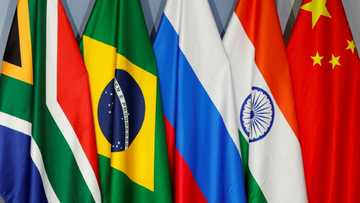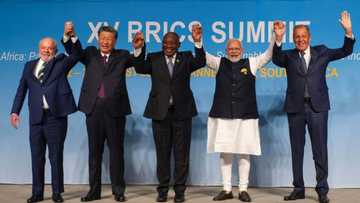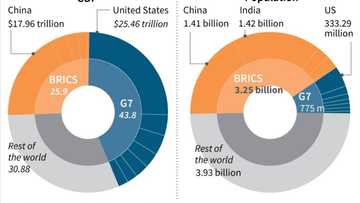Nigeria Listed Among Africa's Top 10 Most Industrialised Nations Despite Exit of Major Companies
- In an impressive feat, Nigeria has emerged as one of Africa's most industrialised countries
- This is according to a report compiled by the African Development Bank and its partners
- The report assesses the current state and disparities in industrial advancement across Africa
Nigeria is Africa's eighth most industrialised country and is one of merely two West African nations featured in the top 10 rankings.
This comes as consolation to the West African nation even though missing out on the top 10 list of richest countries in Africa as compiled by the World Bank.
This is according to the Africa Industrialization Index (AII) report published by the African Development Bank (AfDB) in collaboration with the African Union (AU) and the United Nations Industrial Development Organization (UNIDO).

Source: UGC
The report assesses the current state and disparities in industrial advancement across Africa, serving as a fundamental basis for fostering economic expansion, nurturing exports, and promoting the diversification of economies.
PAY ATTENTION: Сheck out news that is picked exactly for YOU ➡️ find the “Recommended for you” block on the home page and enjoy!
The report allows African governments to pinpoint countries for comparison, aiding them in gauging their industrial progress and identifying optimal strategies more efficiently.
Key metrics used for Africa Industrialization Index
The initial release of the index encompasses 52 of the 54 African countries, except Somalia and South Sudan, due to the unavailability of current data for these nations.
The primary indicators utilised in the ranking encompass manufacturing efficiency, capital investment, labour dynamics, business climate, infrastructure quality, and macroeconomic stability.
Moreover, the index evaluates the industrialisation of African nations from three distinctive aspects: performance, direct determinants, and indirect determinants.
Direct determinants encompass critical assets like capital and labour, examining how these resources are harnessed to propel industrial growth.
On the other hand, indirect determinants embrace conducive environmental conditions, such as macroeconomic stability, robust institutions, and well-developed infrastructure.
AfDB ranking
South Africa
Claiming the pinnacle of Africa's industrialisation rankings, South Africa distinguishes itself as the sole sub-Saharan nation surpassing its North African counterparts. Boasting an index score of 0.8404, it is the African economy that aligns most closely with the global standard.
Morocco
Securing a score of 0.8387 on the industrialisation index, Morocco claims the second position in Africa's rankings. From 2010 onwards, Morocco's manufacturing sector has demonstrated consistent advancement across all categories within the Index, solidifying its status as one of the most robust economies on the continent.
Egypt
Egypt stands out as one of two nations whose comprehensive industrialisation index has remained steadfast since 2010. With the industrial sector contributing 11.7% to Africa's second-largest economy, it also engages nearly a third of its workforce.
Over the past seven years, Egypt has successfully established 10,000 new factories, securing its position as Africa's second-largest manufacturer within the apparel industry.
Tunisia
Tunisia has slipped from its former second-place position to fourth, yet its industrial expansion remains notably robust compared to its African counterparts.
An industrial sector that surpasses agriculture's scale by more than two-fold, Tunisia houses a thriving landscape of over a thousand companies within this realm. Among them, 435 are engaged in full-scale exports, demonstrating an impressive average annual growth rate exceeding 13%.
Mauritius
Mauritius stands as one of the most rapidly advancing economies in Africa. A notable aspect of its growth lies in its adept partnership with the private sector to pinpoint and foster emerging industries, guided by insightful projections of their growth potential.
This collaborative approach has been pivotal in propelling new technology adoption and enhancing quality benchmarks within Mauritius' textile sector.
Eswatini
Securing the sixth position on the Index, Eswatini boasts the most significant portion of manufacturing value added to its GDP, reaching 33% in 2021. The manufacturing sector is pivotal in Eswatini's economy, contributing 65% of the nation's export value.
Additionally, Eswatini secures the second rank for manufacturing value added per capita. Over the span from 2010 to 2021, the country witnessed a steady annual growth rate of 1% in exports, primarily driven by intermediate food products and refined sugar.
Senegal
Among the top ten, Senegal and Nigeria exclusively represent West African nations. Senegal's industrial domain surpasses its agricultural counterpart, engaging 13.6% of its workforce.
Remarkably, Senegal stands out as one of the select few countries that demonstrate substantial advancements within their industrial sectors, having witnessed a notable surge in employment figures, surpassing previous records.
Nigeria
Among the top 10, Nigeria is one of merely two West African nations in this league. The report further notes Nigeria's distinctive position as one of the rare countries to manifest comprehensive enhancements within its industrial landscape.
Within Nigeria's manufacturing sector, food and beverages hold significant sway. Moreover, a noteworthy facet of Nigeria's profile is its adept employment of tariff policies by the government to foster the resurgence of the nation's automotive industry.
Kenya
Kenya's manufacturing production has been consistently ascending for over twenty years, culminating in a record-breaking peak of $7.99 billion in 2021. Distinguished as a prominent exporter of horticulture and tea within Africa, the nation also occupies a pivotal position at the forefront of the continent's digital revolution.
Namibia
Securing the tenth spot in the Africa Industrialization Index rankings, Namibia boasts a substantial country score. In 2021, the industrial sector played a pivotal role, contributing a noteworthy 25% to its GDP, a remarkable figure nearly three times that of agriculture (9.4%).
Additionally, it stands as the country's third-largest employer, signifying its substantial labour engagement. The report underlines Namibia as one of the limited African nations with a well-developed manufacturing landscape, reflecting its advanced standing within the sector.
Vital findings in Africa Industrialisation Index report
- Throughout the evaluation period, Djibouti, Benin, Mozambique, Senegal, Ethiopia, Guinea, Rwanda, Tanzania, Ghana, and Uganda demonstrated significant strides by ascending five or more positions within the rankings.
- Notably, the leading achievers aren't always the nations with the largest economies but those that manage to generate substantial manufacturing value-added per capita, coupled with a notable portion of their manufactured goods destined for export.
- In terms of industrial progress, North Africa maintains its position as the most advanced region within Africa, trailed by Southern Africa, Central Africa, West Africa, and East Africa.
- Collectively, numerous nations have made noteworthy strides in industrial advancement between 2010 and 2021. Of the 52 Regional Country Members, 37 have enhanced their AII scores.
- Nonetheless, a few countries have witnessed only marginal progress, causing them to slip in the rankings due to insufficient score elevation. Simultaneously, a select group has managed to deliver satisfactory outcomes.
- Among them, 25 countries have ascended their ranks, while four have maintained their positions since 2010.
Nigeria missing in top 10 most powerful countries in Africa
In related news, Legit.ng earlier reported that a recent study unveiled a list of Africa's top 10 most powerful nations.
The study defines influential countries as those wielding significant economic, military, and political sway on the global stage.
The nations occupying the highest ranks in African influence have achieved noteworthy progress in economic, political, and societal advancement, thereby meriting their categorisation as influential entities.
The research indicates that the Global Soft Power Index, an organisation specialising in data insights, curated an inventory of the world's most influential nations.
This inventory encompasses 121 countries, evaluated through 11 criteria, drawing insights from approximately 100,000 respondents across more than 102 countries.
Source: Legit.ng








